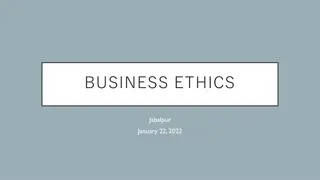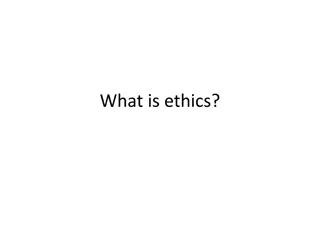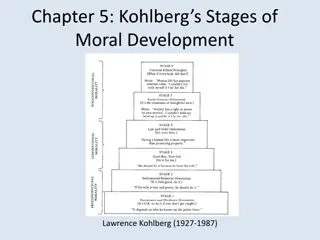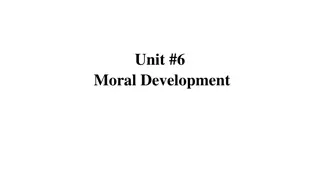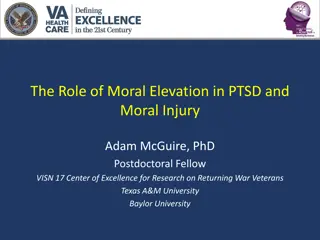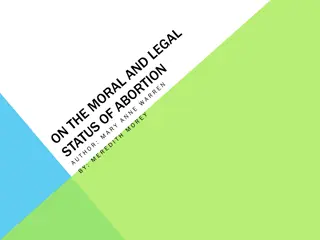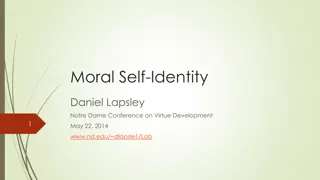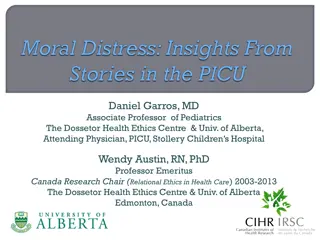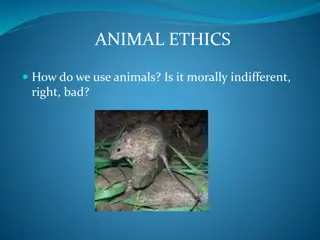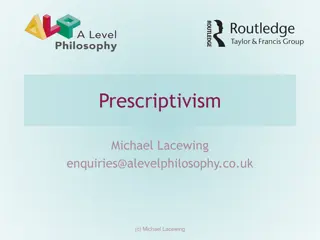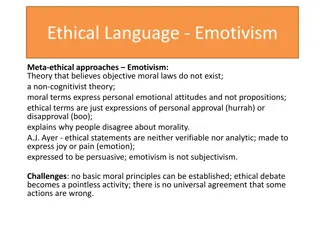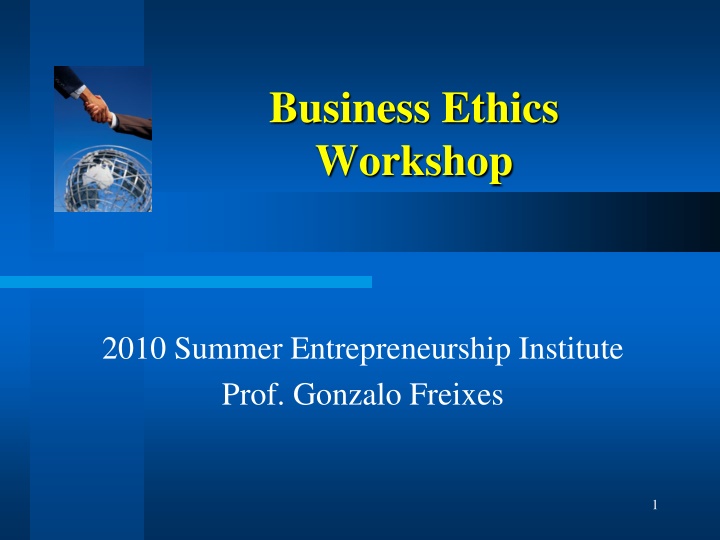
Exploring Business Ethics and Moral Development
This content delves into the fundamental concepts of ethics, exploring what it means to be an ethical person, the theory of moral development by Lawrence Kohlberg, the six pillars of character counts, and the importance of professional ethics. It also highlights common misconceptions about ethics and provides a strategic approach to making better decisions using ethical principles.
Download Presentation

Please find below an Image/Link to download the presentation.
The content on the website is provided AS IS for your information and personal use only. It may not be sold, licensed, or shared on other websites without obtaining consent from the author. If you encounter any issues during the download, it is possible that the publisher has removed the file from their server.
You are allowed to download the files provided on this website for personal or commercial use, subject to the condition that they are used lawfully. All files are the property of their respective owners.
The content on the website is provided AS IS for your information and personal use only. It may not be sold, licensed, or shared on other websites without obtaining consent from the author.
E N D
Presentation Transcript
Business Ethics Workshop 2010 Summer Entrepreneurship Institute Prof. Gonzalo Freixes 1
What is Ethics? "Art, like morality, consists of drawing the line somewhere." G.K. Chesterton, English essayist and poet (1874-1936) Ethics is a code of values which guide our choices and actions and determine the purpose and course of our lives. Ayn Rand, Russian-American novelist/philosopher (1905-1982) 2
Who is an Ethical Person? "A moral being is one who is capable of comparing his past and future actions or motives, and of approving or disapproving of them." Charles Darwin, English biologist (1809-1882) 3
Theory of Moral Development (Lawrence Kohlberg) Level One: Pre-Conventional Morality Stage 1:Punishment - Obedience Orientation Stage 2: Instrumental Relativist Orientation Level Two: Conventional Morality Level Three: Post-Conventional Morality Stage 3: Good Boy - Good Girl Orientation Stage 4: Law and Order Orientation Stage 5: Social Contract Orientation Stage 6:Universal Ethical Principle Orientation 4
Character Counts Six Pillars of Character Trustworthiness Respect Responsibility Fairness Caring Citizenship - Michael Josephson, Josephson Institute of Ethics 5
Professional Ethics Impartiality & Objectivity Openness, Full Disclosure Due diligence, Duty of Care Fidelity to Professional Responsibilities Avoiding Conflicts of Interest (Actual, Potential or Apparent) 6
All the Wrong Reasons Everybody does it. If we don t, someone else will. The only thing that matters is the bottom line! It doesn t really hurt anyone. We ll wait until the lawyers tell us it s wrong. I was just following orders. 7
7 Steps to Better Decisions An Ethical Approach to Business Stop & Think Clarify Goals Determine Facts Develop Options Consider the Consequences Choose Wisely Monitor & Modify 1. 2. 3. 4. 5. 6. 7. 8
Corporate Responsibility What is the purpose of a corporation? Monotonic View vs. Pluralistic View Corporate Constituency Statutes Dolphins & Baby Formula (the case of Star Kist & Nestle) 9
Agents & Fiduciaries Principal Agent relationship Agent has fiduciary duties Loyalty Performance To Obey A can be liable to P or 3rd Parties 10
Fiduciary Duties - Loyalty Stealing Secrets Conflicts Commingling 11
Fiduciary Duties - Performance Care & Skill Reputation Disclose & Notify Account Stay in Scope 12
Fiduciary Duties - Obey Obey your Principal, unless Illegal Immoral 13
Principals Duties to Agent Opportunity to Work Compensation Indemnity Cooperation 14
Corporate Executives Duty of Care Act as a reasonable executive would Protected by Business Judgment Rule Informed decision Rational basis No conflict Protected by Constituency Statutes 15
Corporate Executives Duty of Loyalty Avoid Self Dealing 1. Avoid Common Directorships 2. Avoid seizing Corporate Opportunities 3. 16
Ethics in Global Business Results of International Study 1. Personal Standards: EU 2. Interpersonal Standards (e.g. Loyalty): Japan 3. Organizational Standards: US MNC s deal with ethics ad hoc - viewed as public relations issue 17
SARBANES-OXLEY ACT OF 2002 PUBLIC ACCOUNTING OVERSIGHT BOARD (PCAOB) AUDITOR INDEPENDENCE EXECUTIVE RESPONSIBILITY FINANCIAL/ETHICAL DISCLOSURES 18

